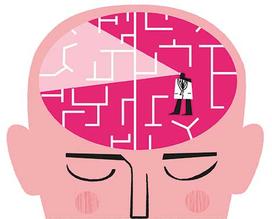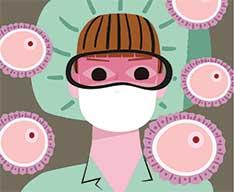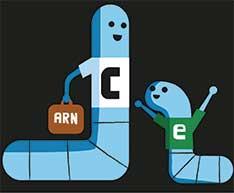Coleen Murphy Researches How Humans Can Live Longer, Better Lives
Coleen Murphy has been pondering the topic of healthy aging for over 20 years. She completed a Ph.D. in biochemistry at Stanford, but it wasn’t until late in her graduate studies that she became intrigued by the question of aging. At the time, researchers had just started using DNA microarrays to analyze multiple genes simultaneously. Biologist Cynthia Kenyon caught Murphy’s attention with her discovery that a single genetic mutation could double the lifespan of the roundworm C. elegans.
Murphy completed a postdoc position in Kenyon’s lab and has been conducting research on C. elegans ever since. At Princeton, where she is a professor of molecular biology and genomics, Murphy uses C. elegans to study how aging affects learning, memory, and reproduction. She hopes that her research will uncover ways to prevent age-related physical and cognitive decline in humans.
Murphy’s Research: A Sampling

Murphy hopes to prevent memory loss while preserving the brain’s ability to learn. With Amanda Kauffman *10, she performed experiments on C. elegans to test the worms’ ability to absorb and remember. The worms were trained to associate a neutral odor with the presence of food, and then tested over time to see how long they retained the memory. Murphy found that worms with a genetic mutation that gives them a longer lifespan displayed superior long-term memory. More recently, she found that activating the protein CREB in the brains of older worms restores their ability to learn and form new memories. Murphy hopes a similar intervention could one day treat cognitive decline in aging adults.

In 2020, Murphy received funding from the Global Consortium for Reproductive Longevity and Equality to support the development of a diagnostic tool to assess a woman’s rate of reproductive aging, which is caused by a decline in the quality of oocytes, or egg cells. Murphy previously found parallels between the oocyte quality in C. elegans and in women. She is now analyzing blood samples from women of different ages to locate biomarkers that indicate how quickly their blood tissue is aging, which should indicate the rate of aging of their oocytes. Murphy hopes this will eventually allow women to regularly track their fertility and empower them in family planning.

Murphy, Rachel Kaletsky, and Rebecca Moore *21 discovered that C. elegans can pass on learned behavior to its offspring. They found that worms that ingest the harmful bacteria PA14 learn to avoid it — but surprisingly, when these worms reproduce, their offspring also avoid the bacteria, even though they’ve never encountered it before. The learned behavior is passed on through four generations of worms. The team found that C. elegans identifies the bacteria as harmful by “reading” its small RNA, and passes this information to its progeny. Murphy is also investigating how retrotransposons — rogue bits of genetic material that can get inserted into an animal’s genome, often with harmful results — can play a positive role in transferring learned information from one worm to another.










No responses yet